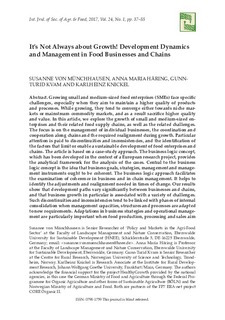| dc.description.abstract | Growing small and medium-sized food enterprises (SMEs) face specific challenges, especially when they aim to maintain a higher quality of products and processes. While growing, they tend to converge either towards niche markets or mainstream commodity markets, and as a result sacrifice higher quality and value. In this article, we explore the growth of small and medium-sized enterprises and their related food supply chains, as well as the related challenges. The focus is on the management of individual businesses, the coordination and cooperation along chains and the required realignment during growth. Particular attention is paid to discontinuities and inconsistencies, and the identification of the factors that limit or enable a sustainable development of food enterprises and chains. The article is based on a case-study approach. The business logic concept, which has been developed in the context of a European research project, provides the analytical framework for the analysis of the cases. Central to the business logic concept is the idea that business goals, strategies, management and management instruments ought to be coherent. The business logic approach facilitates the examination of coherence in business and in chain management. It helps to identify the adjustments and realignment needed in times of change. Our results show that development paths vary significantly between businesses and chains, and that business growth in particular is associated with a variety of challenges. Such discontinuities and inconsistencies tend to be linked with phases of internal consolidation when management capacities, structures and processes are adapted to new requirements. Adaptations in business strategies and operational management are particularly important when food production, processing and sales aim to maintain higher product and process qualities in spite of rapid growth. Reflexive management practices and continuous learning among managers and those in responsible positions, and the related coaching, are key success factors. | |
